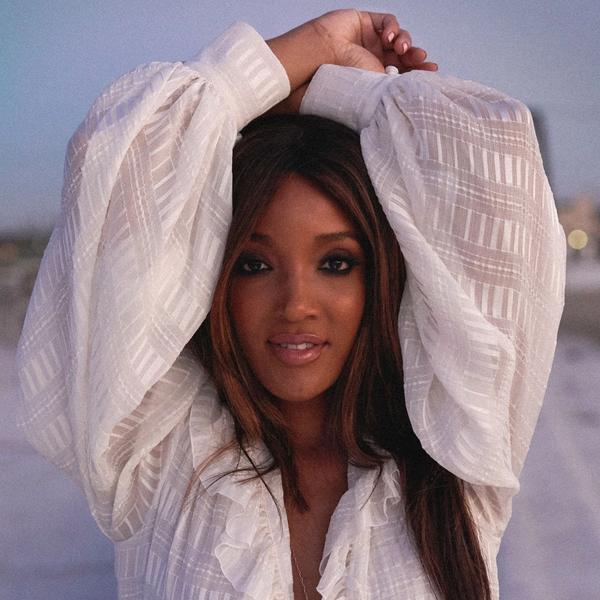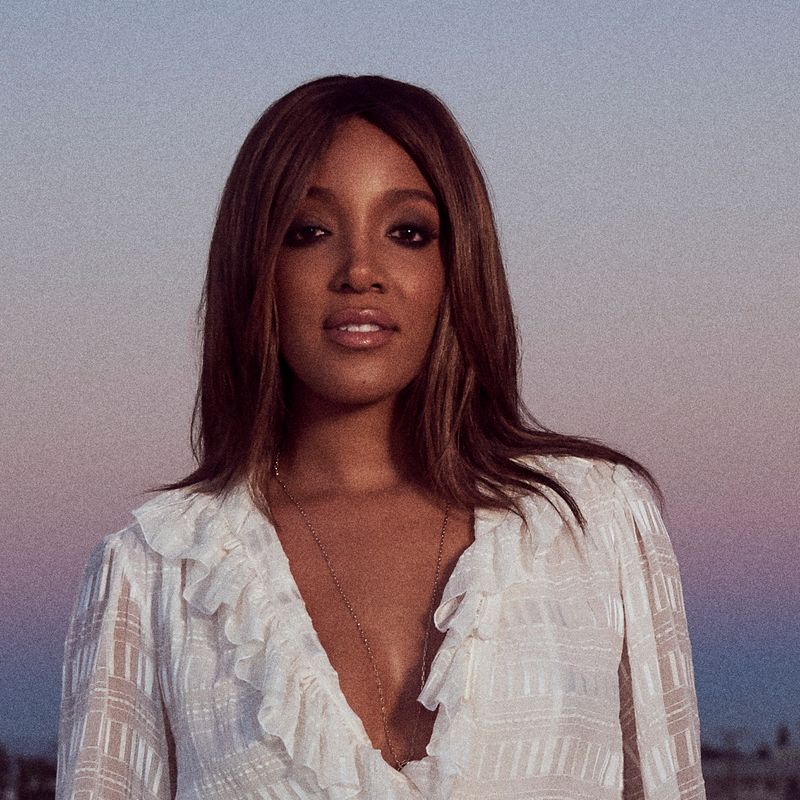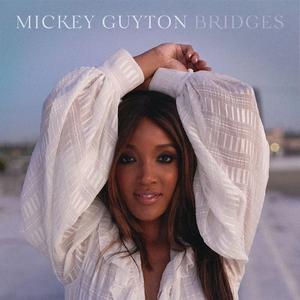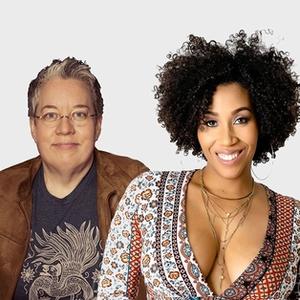




Link copied

Mickey Guyton’s doorbell rings right when we get on the phone to talk. Someone’s sent her flowers. It’s not a special occasion like her birthday or some grand romantic gesture from her husband. Yet there she is, bouquet of flowers in her arms.
As she opens the card, she reads it out loud. “Oh my God. These are from Dean Brody,” she explains. “I did a song with him called ‘Boys'. He wrote, ‘Can’t thank you enough for your powerful and heartfelt vocals, you agreeing to do this meant the world to me.’”
That moment was more than just a sweet sentiment. It was validating for Guyton, 37, who hasn’t had the kind of textbook success in country music that comes easily to someone with her raw talent as a songwriter and a powerhouse vocalist.
Just the week before, Guyton received further affirmation. Upon accepting the CMA award for Female Artist of the Year, Maren Morris used her speech to shine the spotlight on black female artists, including Guyton. “There are so many amazing black women that continue to pioneer this genre, and you’ve made this genre so, so beautiful,” Morris said.
Guyton’s place in Country music history was made concrete last month, when her song “Black Like Me” was nominated for a Grammy. She became the first black female solo artist to have a nomination in a country category, Best Country Solo Performance. “I am speechless. This nomination is a testament to never give up and live your truth. I can’t think of a better song to make history with than ‘Black Like Me’ and I hope that I can continue to help open doors for other women and people who look like me," she said of the nomination.
She shares this is just the beginning – calling her award-nominated EP Bridges the precursor to her first full-length studio album. “We have more songs than necessary, and hopefully it will be finished by the first of next year. But I just can’t make promises right now” she says, knowing that she is on the verge of a major life change. Her son is due in early 2021, and Guyton and her husband Grant Savoy plan to stay in Los Angeles after the baby is born.
Before we spoke about the state of country music and her place within it, Guyton explains what made her want to chase the neon rainbow in the first place.

You’ve talked before about growing up on Dolly Parton’s music. But tell me more about what took you from knowing country to wanting to sing country?
My church in Texas took us to see a Texas Rangers game, and I will never forget hearing LeAnn Rimes singing the national anthem. Seeing someone my age, singing like that, like a grown woman. It hit so different for me, because I was like, “I can do that.”
So as a ten-year-old with that seed of possibility on your mind, how did it become a reality?
It was different for me because I’m a black woman. When I graduated from high school, there were no black women or men in country. Darius Rucker hadn’t even released his country album yet. So I thought, “where can I get an opportunity to be in music?” - Atlanta was too close to home. Nashville wasn’t an option. I knew I’d never be accepted there. I thought I’d go to California and see what opportunities were there. I started at Santa Monica College, studying business management and thinking about being a vocal coach. As I started meeting people, they would hire me to do background vocals for artists like Patti LaBelle and Babyface. So I was going to school, working, sharing a one bedroom with another girl and I only had one credit left to graduate.
This sounds like you’re leading up to a sad story, or a country song?
Kind of. That was when I went through a horrible break up, and I wrote ‘Better Than You Left Me’. I was so lonely, and nothing was happening for me. I decided to move back to Texas. The day that I was going to finish up my last credit, I ran into this hip-hop DJ I knew. He was like, “Hey, you do music right?” I thought he was going to ask me to be in a hip-hop girl group. So I let him know, “I’m not your girl”, but he said, “That’s so crazy because my boy Julian asked me if I knew any black country singers.” It was Julian Raymond, who’d produced so much amazing music, and had produced the last song Glen Campbell recorded. It goes to show you that sometimes God has a plan for you. For me, that came from a hip-hop DJ who knew a country producer who’d said, “If you found a black female country singer, she’d be so big.”
But that’s not exactly how things happened for you. It was at least another decade before you released your first song. Then again, to quote Alan Jackson, “Lordy don’t the wheels turn slow.”
That’s true, but when I started working with Julian, he introduced me to a manager who worked with Keith Urban and Faith Hill. I’m trying to give you the shortest version of the story, which is that it did happen, it just happened very slowly.
Then in 2015, two decades after you’d heard Rimes’ voice, you released “Better Than You Left Me” to country radio, alongside a handful of other well-crafted, undeniably country singles. Then along comes your piano ballad “Black Like Me.” What was your intention there?
I wrote that one with more than just with my own experiences in mind. I wrote it knowing that women, no matter whether you’re white or black, whether you’re privileged or not, we’re all still oppressed.
That’s what makes all your songs relatable, because there’s enough ambiguity in the lyrics that listeners can see themselves in those songs. It reminds me of when Martina McBride was the Issues Song singer. You name it, she had a song about it: domestic violence, drug addiction, poverty. Then again, she also had some carefree songs to balance things out. Is that what ‘Rosé’ is for you, a little levity to give your catalog some balance?
It was. I wrote ‘Rosé’ before I wrote ‘Black Like Me’ and ‘What Are You Gonna Tell Her?’. I thought that women deserved their own country drinking song and I was trying to get on country radio. My label rejected the song. That was so frustrating. I actually went into a deep depression because it showed me that no matter what I did and no matter what I wrote, it was never enough. So that’s when I started writing these other songs about how I felt like I was never given the same chances. I didn’t have the strength to fight it. I went dark on social media as I just needed a minute to cope. As that was happening, I wrote ‘Black Like Me’. I knew the label was going to have a hard time with that song, too, just because the word “black” was in there.
I don’t pay much attention to country radio anymore"
But the old formula for country music success -- write song, cut song, send song to country radio – is just that: old. Radio used to be the only proving ground. Now all the rules have changed. Measuring your success on radio spins these days would be like using an abacus.
That's why I don’t pay much attention to country radio anymore. My whole project is so much bigger than just radio. It’s a body of work that has done really well, It’s been so well received. Country radio is just not as important as it used to be and I’m never going to get accepted that way. I’ve made peace with that. At first, I thought it was only that way in country - then I saw this documentary on E! about women in hip-hop - that completely changed my perspective, because women in hip hop had it worse. Black women as a whole - in every part of our lives - just aren’t given the same opportunities. Period.
I felt bad for being pregnant"
So then how do you wake up every day and pour yourself a cup of ambition?
I’m starting to reprogram my mind to stop thinking like that. Even for instance, with me being pregnant. When I first found out I was pregnant, I was terrified of how this baby was going to affect my career. I felt bad for being pregnant. I know that sounds horrible, but I have to forgive myself for feeling like that and be like, “Wait a second. This is a miracle. I can be a mother and a wife and I can work, too.” That needs to be celebrated and accepted. I think the same goes with ageism: we have to reprogram our minds that our careers are not over when we’re 25 anymore. Let’s be honest. You don’t have a grasp of who you are until your mid-thirties. I am proud of who I am now, and it’s not going to stop me.
I think I speak for most fans when I say, “Please do not let anything stop you.” Your latest single “Heaven Down Here” is literally heavenly. I sure hope God is listening.
Here’s the story behind that one: I’d recently moved back to California -- because my husband is a lawyer here and now I’m pregnant -- so I wrote that song during the quarantine, just while I was watching all the protests happening right outside my window in downtown Los Angeles.
Mickey Guyton's EP 'Bridges' is out now via Capitol Records Nashville.
Photography by Phylicia J.L. Munn
For more on Mickey Guyton, see below:





